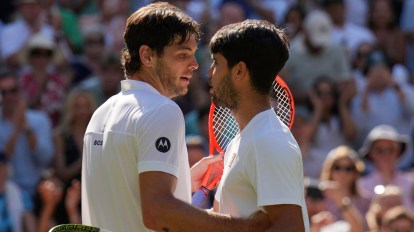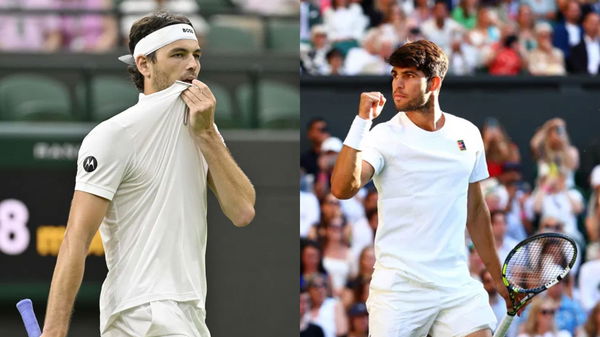Taylor Fritz’s quest for a maiden Wimbledon final ended in heartbreak on Centre Court as he fell to Carlos Alcaraz in a gripping four-set semifinal. The American, who pushed the two-time defending champion to the limit, later admitted that his return of serve—particularly its lack of aggression—proved decisive in the match. As Alcaraz marches into his third consecutive Wimbledon final, Fritz’s candid self-assessment offers a window into the tactical chess match at the top of men’s tennis and the relentless evolution required to beat the world’s best.
Taylor Fritz’s performance at Wimbledon, despite ending in defeat, showcased his immense talent and potential to compete at the highest level. Throughout the match, Fritz demonstrated remarkable resilience, fighting back from difficult positions and challenging one of the sport’s brightest stars. His ability to maintain composure under pressure and execute powerful groundstrokes reflected the years of hard work and dedication he has invested in his game. While the loss was disappointing, it also served as a valuable learning experience that could fuel his growth in future tournaments.
One of the key takeaways from Fritz’s Wimbledon run is the importance of adaptability. Tennis at the elite level demands constant adjustments to opponents’ strategies, court conditions, and match dynamics. Fritz’s admission about needing a more aggressive return game highlights his awareness of this necessity. The ability to read an opponent’s serve, anticipate placement, and respond with assertive returns can shift momentum dramatically. Developing this skill will require focused training, mental toughness, and perhaps a recalibration of his tactical approach during matches.
The mental aspect of Fritz’s journey cannot be overstated. Facing a player like Carlos Alcaraz, who combines physical prowess with psychological tenacity, tests a competitor’s mindset as much as their technique. Fritz’s candid reflection on missed opportunities, particularly in the crucial tiebreak moments, reveals a maturity that bodes well for his future. Learning to seize critical points and maintain confidence during pivotal exchanges is often what separates champions from contenders. This mental growth will be essential as Fritz continues to compete against the world’s best.
Alcaraz’s rise has redefined the competitive landscape in men’s tennis. His blend of speed, power, and strategic intelligence presents a formidable challenge to any opponent. For Fritz and others aiming to dethrone him, understanding Alcaraz’s game in detail is crucial. This involves studying his patterns, strengths, and vulnerabilities to craft effective game plans. Fritz’s experience on Centre Court at Wimbledon provides him with firsthand insights that can inform his preparation for future encounters with Alcaraz and similar top-tier players.
Physical conditioning also played a significant role in the match’s outcome. The grueling nature of Grand Slam tennis demands peak fitness levels to sustain intensity over multiple sets and long rallies. Fritz’s ability to compete vigorously throughout the four sets demonstrated his commendable athleticism. However, enhancing endurance and recovery protocols could give him an edge in tight matches that extend into decisive sets. Integrating advanced sports science techniques into his training regimen might help optimize his physical performance and reduce injury risks.
The role of coaching and support teams is another critical factor in Fritz’s development. Coaches provide tactical guidance, technical refinement, and emotional support that can elevate a player’s game. Fritz’s openness about areas needing improvement indicates a collaborative mindset with his coaching staff. Together, they can analyze match footage, identify patterns, and implement targeted drills to strengthen his return game and other facets. Building a cohesive team environment will be instrumental in translating lessons learned into tangible progress.

Grass courts, like those at Wimbledon, present unique challenges that differ from other surfaces. The low bounce and faster pace require adjustments in timing, footwork, and shot selection. Fritz’s performance showed he is capable of adapting to these conditions, but fine-tuning his approach could enhance his effectiveness. Emphasizing aggressive positioning, quick reflexes, and precise shot placement on grass will be vital for future success at Wimbledon and other grass-court events.
A Battle of Serves and Nerves
From the outset, the semifinal was a showcase of power, precision, and mental fortitude. Alcaraz, renowned for his all-court prowess, set the tone early by breaking Fritz in the opening game and consolidating his advantage with a barrage of unreturnable serves. The Spaniard’s serving, which he has worked tirelessly to improve this season, was nearly flawless—he won a high percentage of first-serve points, fired numerous aces, and repeatedly bailed himself out of trouble with clutch deliveries.
Fritz, however, was no slouch on serve himself. In the second set, he dropped just one of 14 points behind his first delivery and used his own big serve to keep Alcaraz at bay. His aggressive returning in that set, combined with some timely errors from Alcaraz, allowed Fritz to snatch the set and level the contest. The American’s ability to step in and attack the return was crucial in shifting momentum, but as the match wore on, that aggression became harder to sustain.
Fritz’s Admission: The Need for Aggressive Returns
After the match, Fritz was forthright in his analysis. He acknowledged that to beat a player of Alcaraz’s caliber—especially on grass—he needs to be more aggressive on the return of serve. Fritz pointed out that while his own serve was effective, his inability to consistently attack Alcaraz’s delivery, particularly in key moments, allowed the Spaniard to dictate play and escape tight spots.
Fritz’s comments highlight a broader truth in today’s men’s game: against elite servers and all-court players, a passive return is a recipe for defeat. The margins are razor-thin, and the ability to seize initiative—even on return—is what separates champions from challengers.
Turning Points: Missed Chances and Alcaraz’s Resilience
The match was defined by several key turning points, most notably in the fourth-set tiebreak. Fritz, who had fought back from a deficit in the breaker, surged ahead to earn two set points and a chance to force a deciding fifth set. On the first, he unleashed a powerful serve that clipped the line, but Alcaraz responded with a lightning-quick transition from defense to offense, eventually drawing an error from Fritz. On the second, Fritz overhit a forehand—an opportunity lost that he later described as “one I should have attacked more decisively.”
Alcaraz’s ability to absorb pressure and respond with fearless shot-making was on full display. He broke Fritz twice in the third set and held his nerve in the tiebreak, closing out the match with a combination of power, touch, and tactical awareness. For Fritz, the lesson was clear: against a player who can “become unplayable in an instant,” there is no room for hesitation or passivity.

Alcaraz’s Serve: The New “Bot” in Town
Much has been made of Alcaraz’s recent improvements on serve. Once considered the least developed part of his game, his serving at Wimbledon has reached new heights. He has jokingly called himself a “serve bot,” but as analysts point out, he is much more than that—his serve now complements his explosive baseline game, making him a complete threat on grass. Against Fritz, Alcaraz won the first 20 points on serve and never faced a break point after the second set, underscoring the challenge for any opponent to break his rhythm.
Fritz’s struggle to make inroads on return, especially as Alcaraz’s confidence grew, mirrored the difficulties faced by even the game’s best defenders. The American’s acknowledgment of this gap in his arsenal is a sign of maturity—and a roadmap for future improvement.
Looking Ahead: Lessons for Fritz and the Men’s Game
As Fritz digests another near-miss at a major, his focus will inevitably turn to how he can evolve his game to challenge the likes of Alcaraz and others at the top. The American’s serve and baseline power are world-class, but as he himself admits, the next step is to develop a more aggressive, proactive return game—one that can disrupt the rhythm of even the best servers and seize control of rallies from the outset.
For Alcaraz, the win cements his status as the sport’s most dynamic young star. He heads into the final on a long winning streak, seeking a third straight Wimbledon crown and another Grand Slam title at just 22 years old. For Fritz and the rest of the field, the message is clear: to beat the very best, you must be bold, relentless, and willing to step inside the baseline—even when the stakes are highest.
As the tennis world turns its attention to the Wimbledon final, Fritz’s honest admission and Alcaraz’s brilliance offer a blueprint for the next generation—a reminder that at the summit of the sport, it is the smallest margins and the boldest plays that make all the difference.
The broader context of Fritz’s career trajectory is promising. At a relatively young age, he has already made significant strides on the ATP Tour, capturing titles and climbing the rankings. His experience against elite players like Alcaraz adds to his growing resume and prepares him for the challenges ahead. Maintaining a long-term perspective, focusing on continuous improvement, and managing expectations will help Fritz navigate the ups and downs inherent in professional tennis.
Finally, Fritz’s journey resonates beyond the tennis court. His humility in acknowledging weaknesses and determination to improve serve as an inspiration to aspiring athletes. The willingness to confront shortcomings head-on and embrace the grind of development embodies the spirit of competitive sports. As Fritz continues to refine his game and chase Grand Slam glory, his story will motivate others to pursue excellence with passion, resilience, and integrity.
Follow: Taylor Fridtz
Also Read: Sensex and Nifty Plunge: 10 Key Factors Behind the Market’s Alarming Downturn

